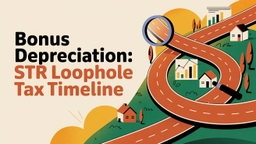Owning a short-term rental (STR) can be more than a hotel venture – it can also be a profitable tax strategy, especially in 2025. With the help of a cost segregation study in combination with 100% bonus depreciation under the newly passed Big, Beautiful Bill (BBB), owners of STRs are able to accelerate deductions substantially and supercharge cash flow.
Here’s how it works, with a real-world example from our investor’s Airbnb in Florida.
Case Study: STR in Florida
This investor purchased a short-term rental property in Florida and had a cost segregation study done when she bought the property. The results were staggering:
| Metric | Airbnb in FL |
| Purchase Price | $1,175,000 |
| Purchase Year | 2023 |
| Depreciation Before Cost Seg | $14,209 |
| Depreciation After Cost Seg | $152,471 |
| Increased Tax Depreciation (Year 1) | $138,262 |
| Increased Cash Flow (Year 1) | $51,157 |
Before Cost Segregation
- Real Property: $700,000
- Land: $475,000
- Depreciable Basis: $700,000
After Cost Segregation
- Real Property: $530,530
- Land Improvements: $21,785
- Personal Property: $147,685
- Land: $475,000
By reallocating nearly $170,000 into accelerated asset categories, this investor boosted first-year deductions by $138,262—providing her with over $51,000 of additional cash flow immediately.
What Investors Need to Know (Frequently Asked Questions)
1. What does bonus depreciation mean?
Bonus depreciation—also known as additional first‑year depreciation—is a tax incentive that permits businesses to immediately deduct a substantial percentage of an asset’s purchase price in the year it is placed in service, rather than spreading the deduction over the asset’s useful life as under regular depreciation rules.
2. Can bonus depreciation create a loss?
Yes—because bonus depreciation accelerates deductions into the first year, it can reduce taxable income enough to produce a net business loss. That loss may then be carried forward into future years, subject to applicable rules.
3. Can you take bonus depreciation on rental property?
No—bonus depreciation does not generally apply to rental property if its MACRS class life exceeds 20 years (e.g. residential rental property’s 27.5-year life). That makes rental buildings ineligible for bonus depreciation.
4. What assets qualify for bonus depreciation?
The IRS defines ‘qualifying property’ for bonus depreciation purposes as:
- Tangible MACRS‑depreciable property with a recovery period of 20 years or less.
- Specific computer software.
- Water utility infrastructure.
- Certain film, television, and live theatrical production assets.
- Newly eligible Section 168(n) of the BBB: Qualified Production Property (QPP)—specific nonresidential real property used in manufacturing or refining. To qualify, construction must begin after December 31, 2024, and the property must be placed in service by December 31, 2030.
Excluded from eligibility are assets that:
- Were used before acquisition by the taxpayer.
- Were acquired from a related party or component member of a controlled corporate group.
- Have a basis derived from a seller or inherited property.







